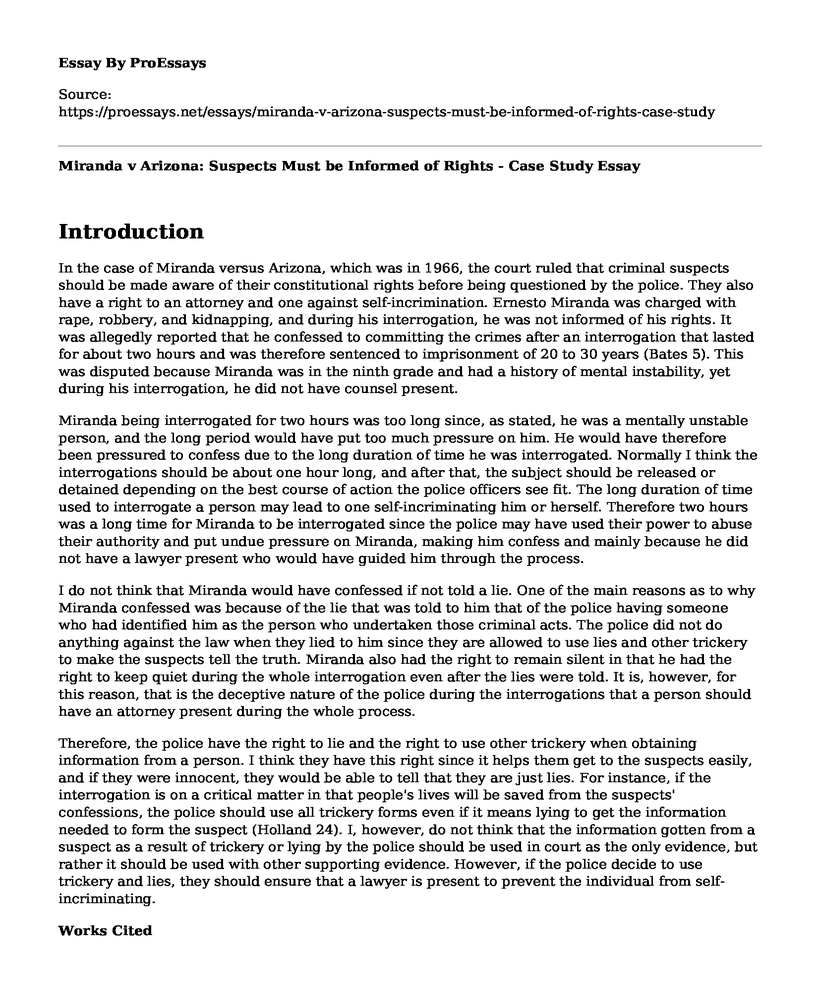Introduction
In the case of Miranda versus Arizona, which was in 1966, the court ruled that criminal suspects should be made aware of their constitutional rights before being questioned by the police. They also have a right to an attorney and one against self-incrimination. Ernesto Miranda was charged with rape, robbery, and kidnapping, and during his interrogation, he was not informed of his rights. It was allegedly reported that he confessed to committing the crimes after an interrogation that lasted for about two hours and was therefore sentenced to imprisonment of 20 to 30 years (Bates 5). This was disputed because Miranda was in the ninth grade and had a history of mental instability, yet during his interrogation, he did not have counsel present.
Miranda being interrogated for two hours was too long since, as stated, he was a mentally unstable person, and the long period would have put too much pressure on him. He would have therefore been pressured to confess due to the long duration of time he was interrogated. Normally I think the interrogations should be about one hour long, and after that, the subject should be released or detained depending on the best course of action the police officers see fit. The long duration of time used to interrogate a person may lead to one self-incriminating him or herself. Therefore two hours was a long time for Miranda to be interrogated since the police may have used their power to abuse their authority and put undue pressure on Miranda, making him confess and mainly because he did not have a lawyer present who would have guided him through the process.
I do not think that Miranda would have confessed if not told a lie. One of the main reasons as to why Miranda confessed was because of the lie that was told to him that of the police having someone who had identified him as the person who undertaken those criminal acts. The police did not do anything against the law when they lied to him since they are allowed to use lies and other trickery to make the suspects tell the truth. Miranda also had the right to remain silent in that he had the right to keep quiet during the whole interrogation even after the lies were told. It is, however, for this reason, that is the deceptive nature of the police during the interrogations that a person should have an attorney present during the whole process.
Therefore, the police have the right to lie and the right to use other trickery when obtaining information from a person. I think they have this right since it helps them get to the suspects easily, and if they were innocent, they would be able to tell that they are just lies. For instance, if the interrogation is on a critical matter in that people's lives will be saved from the suspects' confessions, the police should use all trickery forms even if it means lying to get the information needed to form the suspect (Holland 24). I, however, do not think that the information gotten from a suspect as a result of trickery or lying by the police should be used in court as the only evidence, but rather it should be used with other supporting evidence. However, if the police decide to use trickery and lies, they should ensure that a lawyer is present to prevent the individual from self-incriminating.
Works Cited
Bates, Kristin A. "M Miranda v. Arizona." The Encyclopedia of Juvenile Delinquency and Justice (2017): 1-5.
Holland, Brooks. "Teaching Miranda v. Arizona at its 50th Anniversary." Social Education 80.1 (2016): 20-25.
Cite this page
Miranda v Arizona: Suspects Must be Informed of Rights - Case Study. (2023, Aug 28). Retrieved from https://proessays.net/essays/miranda-v-arizona-suspects-must-be-informed-of-rights-case-study
If you are the original author of this essay and no longer wish to have it published on the ProEssays website, please click below to request its removal:
- Playing God: Death Penalty Cons
- Responses to Qestions on Euthanasia
- Essay on Freedom of Religion ACT of 2017
- Why Texas Should Not Lower the Drinking Age Essay
- Undocumented Immigration and Healthcare Essay
- Paper Example on Criminal Law
- Essay Example on Crime Scene Investigation: Uncovering Hidden Evidence







